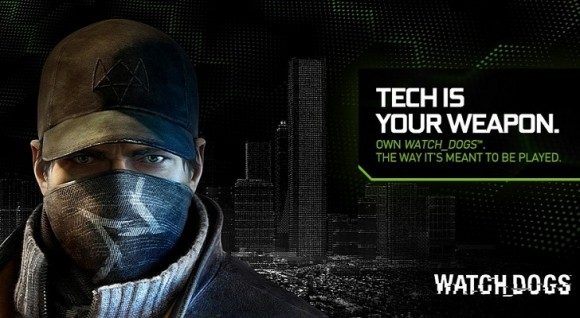Ubisoft’s open-world hack-centric game Watch_Dogs has so far been the company’s fastest selling game in its history, selling more copies on its first day of release than anything Ubisoft has put out. Reviews have so far been generally positive, but the PC version of the game has been plagued with a myriad of technical issues, such as an inability to log on to Uplay, which is required to play the game. More seriously, the game’s performance issues has spurred a war of words between rival graphics card manufacturers Nvidia and AMD as Ubisoft scrambles to work on an optimization patch.
Many PC gamers, particularly those whose rigs use AMD graphics cards, have complained that the Watch_Dogs is poorly optimized and runs terribly, with low framerates and frequent stuttering taking place.
Sebastien Viard, the game’s graphics technical director, tweeted:
Watch Dogs can use 3+ GB of RAM on [next-gen] consoles for graphics, your PC GPU needs enough VRAM for ultra options due to the lack of unified memory […] If you experience lag/stutter on a fast PC, try to lower one of those settings to reduce the GPU VRAM usage: texture quality, AA, resolution.
This should come as no surprise considering Watch_Dogs‘ steep system requirements, and Viard also added that work is being done to put out a patch that optimizes performance.
However, the game’s particularly poor optimization for AMD cards seems to stem from Ubisoft’s close collaboration with AMD’s rival, Nvidia. Watch_Dogs is one of several new games that uses Gameworks, a set of libraries and tools from NVIDIA which includes technologies such as Temporal Anti Aliasing, a more advanced version of AA, and ShadowWorks, which produces high quality shadows.
Nvidia’s collaboration with Ubisoft on Watch_Dogs essentially means that its chief competitor, AMD, was shut out of the development process. In an email conversation with Forbes, AMD’s Robert Hallock said:
Gameworks represents a clear and present threat to gamers by deliberately crippling performance on AMD products (40% of the market) to widen the margin in favor of NVIDIA products. Participation in the Gameworks program often precludes the developer from accepting AMD suggestions that would improve performance directly in the game code—the most desirable form of optimization. The code obfuscation makes it difficult to perform our own after-the-fact driver optimizations, as the characteristics of the game are hidden behind many layers of circuitous and non-obvious routines. This change coincides with NVIDIA’s decision to remove all public Direct3D code samples from their site in favor of a ‘contact us for licensing’ page. AMD does not engage in, support, or condone such activities.
The Forbes article notes that, upon extensive benchmarking of Watch_Dogs with both Nvidia and AMD cards, Nvidia does indeed run significantly better than AMD. Hallock adds that as a result his company has had very little time to work on optimizing the game, but have made some headway recently “despite deliberate obfuscation attempts.”
Meanwhile, Nvidia have hit back at Hallock’s claims, with Director of Engineering, Developer Technology Cem Cebenoyan stating:
I’ve heard that before from AMD and it’s a little mysterious to me. We don’t and we never have restricted anyone from getting access as part of our agreements. Not with Watch Dogs and not with any other titles,” he said. “Our agreements focus on interesting things we’re going to do together to improve the experience for all PC gamers and of course for Nvidia customers. We don’t have anything in there restricting anyone from accessing source code or binaries. Developers are free to give builds out to whoever they want. It’s their product.
Whatever the case, both companies have put out drivers with optimizations for Watch_Dogs, and given the popularity of the game, it is likely that more performance updates from Nvidia, AMD and Ubisoft will follow.
Play games, take surveys and take advantage of special offers to help support mxdwn.
Every dollar helps keep the content you love coming every single day.


